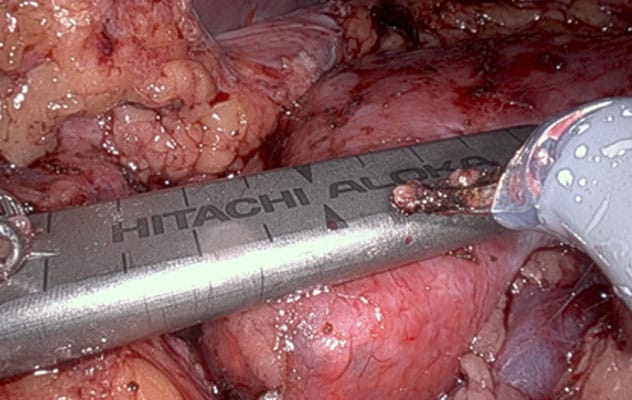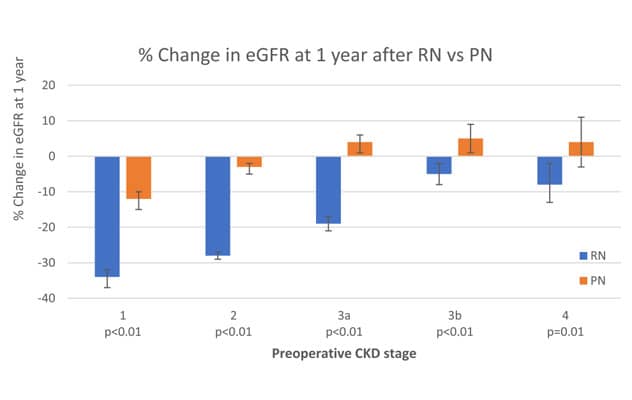Dec. 13, 2022
Baseline chronic kidney disease (CKD) is an important risk factor for cardiovascular illness, hospitalization and mortality — and these risks are greater at higher stages of CKD. Furthermore, progression from a lesser stage to CKD stage 3B or higher (eGFR < 45 mL/min/1.73m2) has been associated with increased cardiovascular events and mortality, irrespective of other coexistent medical conditions, according to a study in the New England Journal of Medicine.
Due to the importance of minimizing renal functional decline, postoperative kidney function is one of the primary considerations when considering treatment options for renal masses suspicious for renal cell carcinoma. While most series have demonstrated a renal functional benefit to partial nephrectomy relative to radical nephrectomy, the renal functional outcomes by preoperative chronic kidney disease stage are not well described.
A multidisciplinary group of investigators, including from Urology, Nephrology and Hypertension, Laboratory Medicine and Pathology and Quantitative Health Sciences, at Mayo Clinic compared postoperative renal functional outcomes when stratified by preoperative CKD stage. Results were published in the November 2022 issue of Urology.
"We sought to more clearly demonstrate the comparative risks of kidney disease stage progression depending on your preoperative stage, in order to be able to provide our patients with a clearer picture of their risk of kidney disease stage progression and the possible risks associated therein," notes Cameron J. Britton, M.D., a urology resident at Mayo Clinic in Rochester, Minnesota, and the first author of the manuscript.
Methods
The authors of the study retrospectively evaluated patients at Mayo Clinic undergoing either radical nephrectomy or partial nephrectomy for unilateral solid renal masses between 1980 and 2018. Multivariable linear regression models were used to assess percent change in estimated glomerular filtration rate (eGFR). Competing-risk Cox proportional hazards models were used to assess for increase in CKD. These statistical tools were used to determine if there was a significant interaction between surgical technique, radical or partial nephrectomy, and preoperative stage as it related to individual postoperative outcomes. The Kaplan-Meier method was used to determine CKD stage progression-free survival.
Results
كتلة كلوية

كتلة كلوية
الكتلة الكلوية للقطب العلوي الأيسر مع التصوير بالموجات فوق الصوتية أثناء العملية قبل استئصال الكلية الجزئي الروبوتي
الجدول 1. ارتباط استئصال الكلية بتقدم مرض الكلى المزمن

الجدول 1. ارتباط استئصال الكلية بتقدم مرض الكلى المزمن
ارتباط استئصال الكلية الجذري مقابل استئصال الكلية الجزئي بتقدم مرحلة مرض الكلى المزمن
The percent change in eGFR at one-year follow-up was significantly worse for radical nephrectomy compared with partial nephrectomy for all preoperative CKD stages. Radical nephrectomy was associated with an increased risk of CKD stage progression for preoperative CKD stages 1-3B, but not for CKD stage 4.
Patients undergoing radical nephrectomy are at an increased risk of percent eGFR decline compared with patients undergoing partial nephrectomy for a renal mass. While patients who underwent radical nephrectomy also had a greater risk of CKD stage progression for preoperative CKD stages 1-3b, no significant difference was noted for patients with baseline CKD stage 4.
الجدول 2. النسبة المئوية للتغير في معدل الترشيح الكبيبي التقديري في المتابعة لمدة عام واحد

الجدول 2. النسبة المئوية للتغير في معدل الترشيح الكبيبي التقديري في المتابعة لمدة عام واحد
النسبة المئوية للتغير في معدل الترشيح الكبيبي التقديري في المتابعة لمدة عام واحد للمرضى الذين يخضعون لاستئصال الكلية الجزئي والجذري بناءً على مرحلة مرض الكلى المزمن قبل الجراحة
Aaron M. Potretzke, M.D., a urologist at Mayo Clinic in Rochester, Minnesota, states: "While multiple factors likely played a role in there not being a significant difference between radical and partial nephrectomy in CKD upstaging for patients with CKD stage 4, it is likely that patients undergoing nephrectomy were highly selected based on the impression that the remaining, contralateral kidney would provide adequate function to keep a patient off of dialysis, in situations where that was possible.
"Patients with advanced CKD stages undergoing partial nephrectomy showed an improvement in eGFR at their follow-ups. This is likely indicative of close follow-up and expert nephrology care to minimize risk factors for further medical renal disease. We believe this type of multidisciplinary care for all patients with advanced renal disease is paramount to good long-term outcomes."
For more information
Go AS, et al. Chronic kidney disease and the risks of death, cardiovascular events, and hospitalization. New England Journal of Medicine. 2004;351:1296.
Britton CJ, et al. Progression of chronic kidney disease following radical and partial nephrectomy. Urology. 2022;169:125.
Refer a patient to Mayo Clinic.